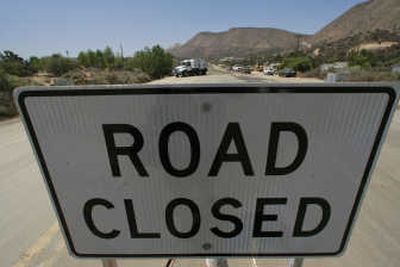Rage at road work forces highway closure

WRIGHTWOOD, Calif. – California highways have been shut down by wildfires, mudslides, earthquakes and police chases. Add one more hazard to the list: road rage.
Drivers inconvenienced by a road-widening project subjected construction workers to so much abuse – including death threats, BB gun shootings, even a flying burrito – that the state revoked a rush-hour window and shut down the highway altogether.
Now drivers who relied on California Highway 138 are being forced to take a detour that costs them at least a half-hour a day and businesses along the road are suffering.
“A few inconsiderate people have ruined it for the rest of us,” complained Julie Dutra, who owns a scrapbook and stationery store in this town nestled in the Angeles National Forest about 50 miles northeast of Los Angeles.
Dutra’s complaint has become a familiar refrain in a state where people have moved in droves from big cities to a more affordable lifestyle in valleys, deserts and mountains, where they hope to escape the hassles of urban living that often come with more cars: congestion, smog and aggressive driving.
Highway 138 connects two such areas that have swollen with urban refugees in the past decade or so. Without it, roughly 20,000 drivers a day have to take a winding, two-lane road or other, indirect routes that predate the region’s population boom.
“If you have taken time out of someone’s day and add more time to it, their patience levels go off the Richter scale,” said Terri Kasinga, a spokeswoman for the California Department of Transportation.
In the five years leading up to the start of construction last summer, there were nearly 3,000 traffic collisions and 68 deaths, according to the California Highway Patrol. The highway had become so dangerous it had been dubbed “Blood Alley.”
A $44 million widening project was supposed to alleviate the danger, not create a new class of victims.
The first sign things were going to turn ugly was after the transportation department allowed drivers to use the highway only during rush hour last summer, with traffic flowing in one direction at a time and creeping along behind escort vehicles.
One person called and said he would climb a water tower and shoot workers. Next came angry exchanges, with one driver tossing a burrito at a construction worker. Vandals tore down barricades and construction equipment was stolen, and authorities threatened to shut down the highway.
“We explained to the community that if this continued we would omit the escorts,” said Dennis Green, a transportation department consultant.
The warning didn’t seem to resonate.
Last September, Charles Fenn was arrested and charged with assault with a deadly weapon on allegations that he clipped a flagman with his vehicle on his way home to Wrightwood. When authorities finally caught up with him at his house, they noticed he had shaved off his mustache, said CHP Officer Jeff Perez.
“I’m the victim,” Fenn maintained in a brief phone interview, declining to comment further. His criminal case is pending and he’s been sued by the flagman. Fenn has pleaded not guilty.
In November, an elderly woman struck another construction worker who was badly injured and has not returned to his job. It wasn’t known if the woman’s actions were intentional or she was confused, Kasinga said.
Earlier this year, another worker felt a stinging sensation on the back of her leg. When she looked down, she found a BB pellet on the ground, Kasinga said.
Citing the continued clashes and the need to expand the construction zone, the state shut down the road last month and made good on its threat to yank the escorts.
There hasn’t been any violence lately, and the contractor now expects to finish by Sept. 11, a couple of weeks early.
Although many of the communities support the road repairs – the first major improvements since 1934 – businesses have been crippled by the closures. Some stores in this tourist town that is home to Mountain High ski resort report a drop of as much as 50 percent in sales from last summer.
“It was a ghost town last weekend,” said Nancy Youngblood, who owns a collectibles shop called Something Old, Something New. “We just don’t want people to forget about us.”